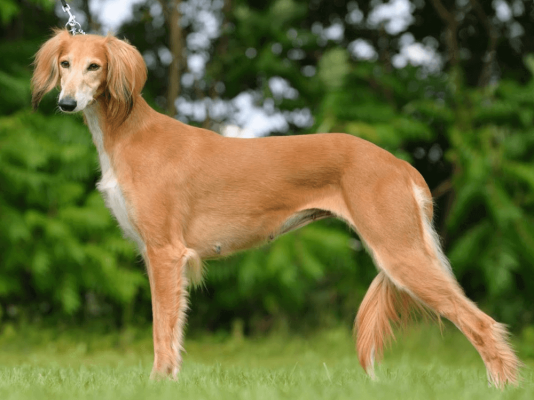The Borzoi breed is a dog with many dog aficionados who appreciate its elegant look and the soft demeanor. While bred for hunting in Russia, these dogs have a calm demeanor, sleek, aerodynamic form and huge prey drive.
However, Borzois, like any other breed, do also have their health and behavior problems. You can read more about the typical Borzoi breed problems so that you can give your new best friend the best care.

1. Digestion Sensitivities
One of the most often noted problems of Borzoi breeder’s is the sensitive digestive system of Borzoi breed members. Gastrointestinal problems and unsettled stomachs seem to be problems many Borzois have that present themselves as loose stools, vomiting, or lack of appetite. This sensitivity normally requires owners to be vigilant about their food.
Some of the Borzois do very well on a balanced, premium dog food, but others may need a diet specially formulated to reduce gastrointestinal distress such as a limited ingredient diet or foods with easily digested ingredients.
2. Joint and Bone Conditions
Bearing in mind that Borzois are big, agile dogs with bone and joint problems such as hip dysplasia. A disorder caused by an improper fit of the hip joint into the socket evidenced by pain, lameness and finally stiffness due to arthritis. Any big breed can have hip dysplasia, but Borzois become more at risk due to their strange body form.
There have also been reports of another orthopedic disorder in certain Borzois, that of osteochondritis dissecans (OCD), the separation of cartilage from the bone that will cause joint discomfort. This disorder usually affects the elbows or shoulders and needs to be corrected surgically.
3. Heart Health Issues
Borzois are also prone to heart disease. However, some of this breed have dilated cardiomyopathy (DCM) where the heart is enlarged and weak. Coughing, dyspnea, and lethargy develop because DCM impairs the heart’s ability for efficient blood pumping.
A heart healthy diet with taurine, an amino acid good for heart operation is recommended for Borzois. Although nobody knows exactly how DCM originally developed, a number of studies have shown a genetic correlation between the development of DCM in various breeds and grain free diets. They are easy to care for, and will have a good coat and will keep the worst skin irritations away with regular brushing and the odd expert grooming.
4. Disorders of Skin and Coat
Borzois have a unique coat that is aesthetically pleasing yet hard upkeep. Their long, silky hair matts tangles easily, hence frequent maintenance is very important. Matting left neglected could cause skin diseases and irritation. Their coat may be maintained and skin irritations avoided with regular brushing and sporadic expert grooming.
Borzois also run the risk of sebaceous adenitis, an autoimmune skin condition causing oily coat, scaly skin, and hair loss. This disorder is persistent and may need continuous therapy using certain shampoos, pills, or drugs to control symptoms

5. Behavioral Difficulties and Training Need
Borzois are not particularly demanding or challenging to train, but they have a calm and diplomatic aura that may make them a little sensitive and autonomous, which would present special problems in their training.
Out of those two, they are famously quiet. Although these dogs rarely act hostile simply because of a natural distance between them, a Borzoi should be made used to people and other animals from a very early age to prevent shyness or nervousness around strangers or new people or pets.
6. Eye Issues
Cataracts and progressive retinal atrophy (PRA) are eye diseases among which Borzois are prone. Finally, PRA causes blindness to become a progressive illness. However, PRA cannot be cured, but frequent eye examinations can help identify it as it progresses, so it can be treated appropriately when found.
By knowing the normal Borzoi breed problems, owners will know how to improve the lifestyle of their dog and give the very best treatment. Though some dogs have certain health and behavioral issues, they could get through to enjoying a contented, healthy life by going to the veterinarian, eating a well balanced food, and grooming their dog regularly.
